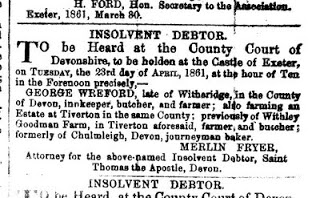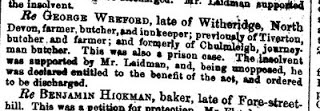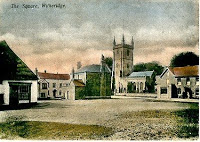Last month, I discovered my 3rd great grandfather, George, was not found in the 1861 census partly because he was in jail for bankruptcy. You can read the story so far in my post Ancestor Found (almost).
Unfortunately, I have still not been able to locate him on the 1861 census. After eventually finding Exeter Gaol in the census records, I also found the prisoners were listed by initials only. ‘A-ha!’ I thought, ‘That explains why I couldn’t find him through a name search’ – but I couldn’t find any prisoner with the initials G.W. Not to be deterred, I then combed the entire list of prisoners by their age and birthplace looking for suitable or even approximate matches but I have still not found George WREFORD.

Another reference to his upcoming hearing at the county court at first seemed identical to the notice in the London Gazette EXCEPT, it claims he was a journeyman baker in Chulmleigh – this may be another lead or a Victorian typo. (The London Gazette referred to him as ‘Journey-man Butcher’, which is more likely).
More importantly, upon rereading, I noticed that it mentioned George was “to be holden at the Castle of Exeter”. This could explain why he was not in the County Gaol on the 1861 census! Census night was 7 April 1861 – this excerpt was from the 10 April 1861 edition of the newspaper.
The next ‘clipping’ concluded what must have been a very difficult time in my ancestor’s life.
The insolvent was supported by Mr. Laidman, and, being unopposed, he was declared entitled to the benefit of the act, and ordered to be discharged.
I am aware that the laws surrounding bankruptcy changed in 1861 but if anyone can explain simply to me what the change was, I would love to know. I would also like to know what being supported by someone meant. I have a feeling, old George was quite lucky to have his case heard in this particular year.

Next steps:
- Search the 1861 census for ‘the Castle’ and its inmates
- Find a simple explanation for the Bankruptcy Act






